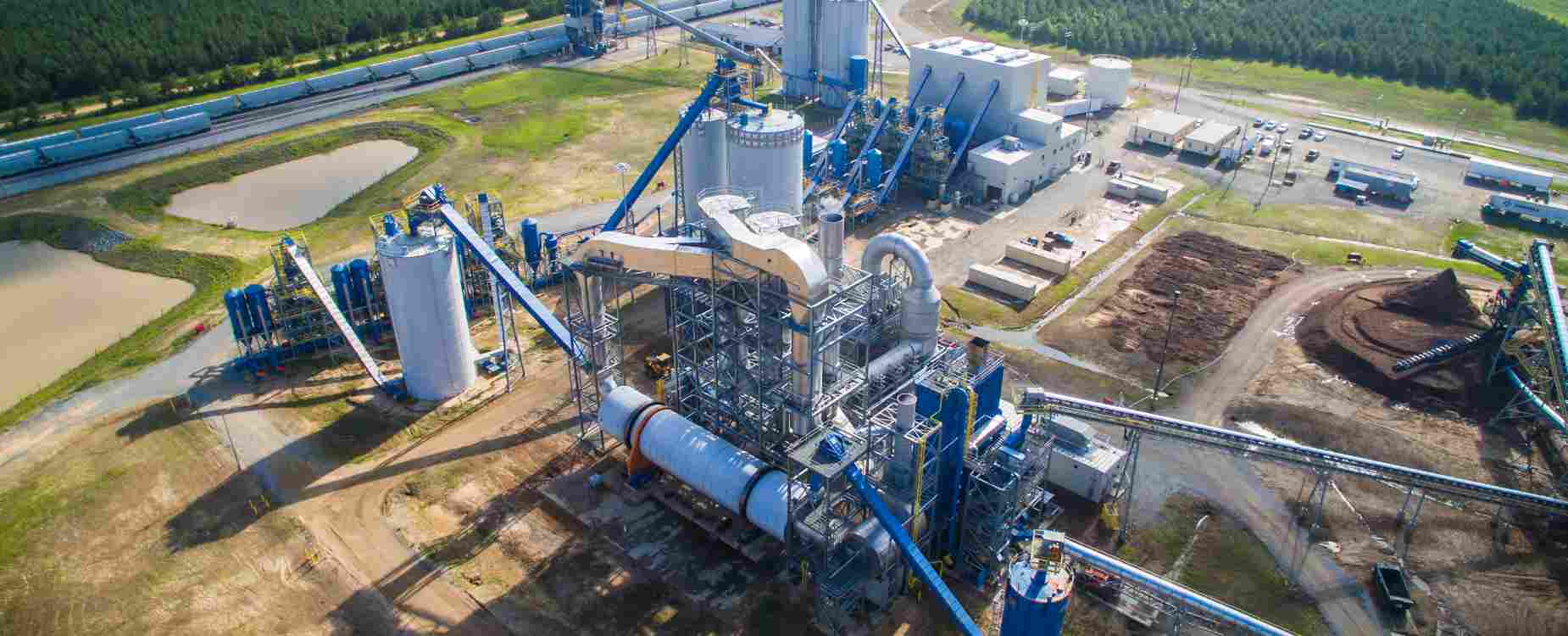
fuel pellet plant
As an important link in the green energy industry, fuel pellet plant plays a particularly critical role in modern industry and life. Its main function can produce biomass pellets suitable for a variety of fields, such as combustion heating and power generation.
RICHI Machinery is a professional manufacturer of complete sets of biomass pellets, focusing on processing various biomass raw materials into high-quality biomass pellets. Whether it is carrying out small-scale production operations or building large-scale and high-capacity production lines, RICHI Machinery can accurately match needs with its rich product lines and customized services. From raw material pretreatment equipment to granulation host, to cooling and packaging systems, one-stop equipment supply and technical support are provided to ensure efficient and stable operation of the production process. It is a reliable choice for biomass pellet production.
Video of fuel pellet plant
This video shows the biomass pellets manufacturing process, can help you have a better understanding of how biomass pellets are made. It is a trail video of one of our customers, whose raw materials is hay.
This fuel pellet plant mainly consists of raw materials preparing section, crushing system, pelletizing system, cooling section, screening section, packing section. It is a complete pellet production lines from raw materials into biomass pellets packing.
Main equipment in this biofuel pellet plant is high efficiency biomass chipper, crushing machine, biomass pellet machine, biomass pellet cooling machine, biomass pellet packing machine, conveying equipment and other auxiliary equipment.
If you want to join the biomass pellet business, we strongly recommend you RICHI Machinery, which is a really professional biofuel pellet plant manufacturer. Our experienced technical team will customize a production line that will bring you high profitability, so please feel free to choose us.
RICHI MACHINERY
Raw materials for fuel pellet plant
Biomass pellet plants can utilize a variety of biomass resources, which are widely distributed in multiple fields such as agriculture, forestry, fishery, food industry, and urban communities. The following are detailed categories and introductions:
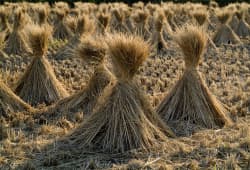
Crop straw
The remaining part after harvest of crops such as corn, sorghum, wheat, rice, beans, cotton, etc. After processing these straws, they can become important raw materials for biomass pellets.

Agricultural processing waste
Such as rice husks, peanut husks, etc. These wastes are generated during processing and can be used to produce biomass pellets after treatment.
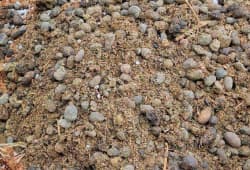
Livestock and poultry manure
Such as cow manure, pig manure, etc. These manures can be converted into biomass pellets after treatment and are used for energy production.
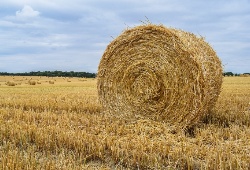
Cereals
By-products produced during the processing of grains, such as bran, rice bran, etc., can also be used as raw materials for biomass pellets.

Marine and wetland animal products and their waste
Including processed waste of marine organisms such as fish and shellfish. These wastes can be used to produce biomass pellets after treatment.
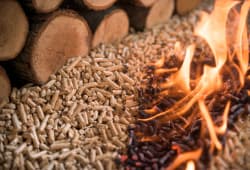
Firewood Forest
Forests used for burning energy supply are one of the important sources of biomass pellets. Scattered wood, branches, etc. produced in forest operations, these residues can be used to produce biomass pellets after treatment.
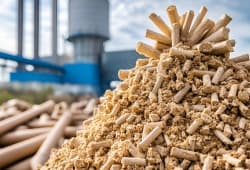
Wood processing waste
Such as scraps, sawdust, wood chips, etc. These wastes are produced during wood processing and are high-quality raw materials for biomass pellets.

Wood chips and sawdust
Wood chips from the construction wood or packaging wood industry can be used to produce biomass pellets after treatment. Sawdust produced during wood processing is one of the important raw materials for biomass pellets.

High quality production lines make high-quality biomass pellets
The raw materials of fuel pellet plant are diverse, ranging from agricultural and forestry waste to industrial scraps, covering a wide range of areas. How do these raw materials be converted into high-quality pellets? Let’s go to the core characteristics of the production line together.
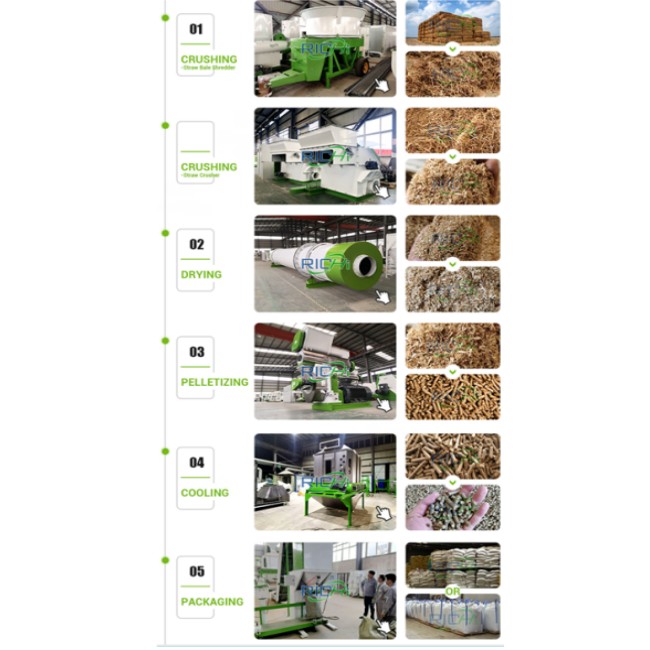
Characteristics of fuel pellet plant
(1) Equipped with professional anti-caking feeders to solve the problem of easy agglomeration of raw materials, ensure that raw materials can enter the machine smoothly and unhinderedly, laying a solid foundation for stabilizing the production process.
(2) The production line is easy to operate and easy to understand, and the maintenance is also easy and convenient. It does not require complex professional knowledge and excessive manpower investment, making it worry-free for daily use.
(3) Biomass pellets are widely used and shine in many fields such as biomass power plants and steam boilers. They are clean and renewable energy sources, and have a broad market prospect.
(4) Our pellet production line can process a variety of biomass materials, including wood, agricultural residues, grass and industrial waste.This flexibility allows you to source locally available materials for cost-effective production.
(5) Our wood chip pellet production line has high production efficiency and objective hourly output. It is designed with energy saving in mind, making power consumption low, and optimizing energy use, which helps reduce operating costs while maintaining high output.
(6) It has a wide capacity scale.The production capacity range of this production line is 1-40T/H.If you want a larger capacity, we can also customize one for you.The production line has a wide capacity scale, 1-40T/H is flexible and optional. If you have higher demand, you can customize larger production capacity, perfectly adapt to various production scales.

Contact Us
What are the benefits of fuel pellet plants?
In today’s era of pursuing green development and efficient resource utilization, biomass fuel pellet plants have shown many significant benefits and are gradually becoming a production choice favored by many industries.
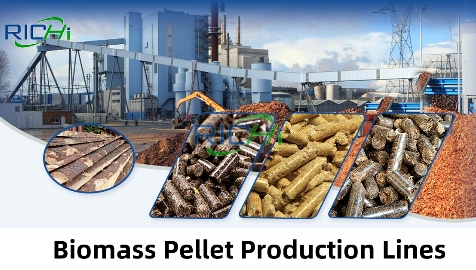
Achieve efficient resource transformation
Relying on the fuel pellet plant, the biomass pellet factory has strong raw material processing capabilities and can process various biomass materials into high-quality pellets using equipment such as the biomass pellet mill. Whether it is the large amount of waste generated in agricultural and forestry production—such as crop straw or grasses commonly found in the field—these materials can realize their value through this production line. The use of the biomass pellet mill ensures efficient conversion, allowing the earth’s resources to be more fully and effectively utilized, while significantly reducing resource waste.
Promote environmental protection and alleviate pollution
The production of biomass pellets has a positive and important impact on environmental protection. Traditionally, the treatment of biomass materials such as agricultural and forestry waste is often relatively extensive, such as the burning of crop straw in the open air, which will not only cause serious air pollution, but also affect ecological and environmental factors such as soil quality. The biofuel pellet plant collects and processes these biomass materials that may have caused harm to the environment in a centralized manner and converts them into clean energy carriers – biomass pellets, thus avoiding various environmental pollution problems caused by improper treatment methods and playing an important role in promoting ecological environment improvement.
Meet production needs of multiple scales
This production line is extremely versatile. Whether it is a small biomass pellet factory, in order to meet the energy supply needs in local areas, or a large-scale production company, it is committed to providing biomass pellet products to a wider market, it can meet your production needs. Moreover, no matter which size the manufacturer is, it can flexibly adjust production strategies according to its own development plan and market demand to ensure the stable output of biomass pellets and meet the diversified needs of different customer groups.
Widely used
Biomass pellets produced by the fuel pellet plant have a wide variety of uses. They can not only be used as fuel for direct combustion, but also provide a clean source of heat for home heating, industrial heating, etc., and provide a continuous stream of energy support for the society. In addition, biomass pellets also play an important role in many fields such as agricultural breeding and biomass raw materials, showing extremely high application value, further broadening their market prospects, and injecting strong impetus into the development of the entire industrial chain.
Various types of biomass pellets can be produced
The fuel pellet plant can produce a variety of biomass pellets according to different raw material characteristics and market demand. For example, straw pellets can be made from crop straw as raw materials. These pellets are widely used in biomass heating, agricultural breeding bedding, etc. in rural areas; wood pellets produced by processing remaining wood chips are high-quality fuels for biomass power plants, industrial boilers, etc.; rice husk pellets, grass pellets, etc. They each play their advantages in different energy application scenarios with their unique physical and chemical properties, meet the needs of various industries for different types of biomass pellets, and further reflect the flexibility and adaptability of the biomass fuel pellet plant.
RICHI MACHINE
What capacity specifications can be designed for our fuel pellet plant?
Whether you need to operate production at a small scale or a large scale production line, RICHI Machinery can provide you with biomass fuel pellet plants with a variety of different production capacities to meet your needs. Below is the production capacity of biomass production lines that we can design.

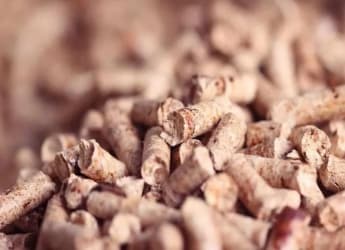
0.5-2 tons/hour straw pellet plant
The 0.5-2 tons/hour straw pellet plant is the best choice for processing straw and realizing resource reuse. It can convert common straw into straw pellets with multiple advantages. It is a renewable fuel with low pollution and economic advantages. And it makes full use of crop waste such as corn stalks, rice straw, wheat stalks, and cotton stalks to make pellets. This not only solves the environmental pollution problem caused by straw burning, but also creates new economic value, and has great development potential in the energy and agriculture fields.

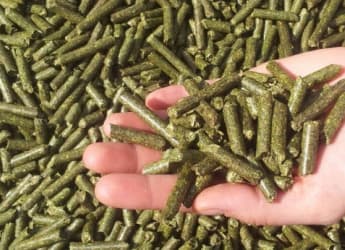
2-3 tons/hour Alfalfa pellet production line
2-3 tons/hour alfalfa pellet production line is a professional production line tailored to the production of alfalfa pellets. Alfalfa pellets have multiple values. They not only belong to the category of biomass pellets, but can be used as clean energy in areas such as combustion heating and power generation, helping the development of green energy; at the same time, alfalfa pellets can also be used as cattle feed pellets. It is rich in protein, vitamins and other nutrients, which can effectively promote the growth and development of cattle, improve the quality of meat and milk production, and provide strong guarantee for the healthy development of the animal husbandry industry.

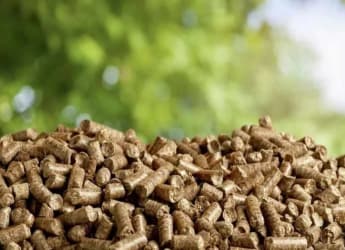
3-5 tons/hour Bamboo pellet production line
The bamboo pellet machine plays a central role in the 3-5 tons/hour bamboo pellet production line, efficiently processing waste bamboo into clean-burning bamboo pellets. As a new type of biomass fuel, bamboo pellets offer significant environmental advantages, producing low emissions and serving as an excellent alternative to traditional fuels. They are widely used not only in power generation and heating but also in industrial and agricultural applications, such as soil improvement and filler materials. This production line promotes the recycling of bamboo resources, generating economic value while supporting the growth of eco-friendly industries.

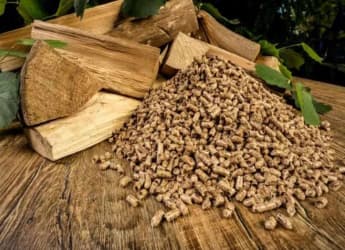
5-10 tons/hour wood pellet factory
The 5-10 tons/hour wood pellet factory has built a complete and efficient production system, and its process covers multiple links such as raw material preparation, crushing, drying, granulation, cooling and packaging. During the raw material preparation stage, the remaining sawdust from various wood processing is collected; the sawdust will be further refined in the crushing process for subsequent processing; the drying process strictly controls humidity and provides appropriate conditions for granulation. The core granulation step can accurately process the processed sawdust into pellets.
The sawdust pellets made of have significant environmental protection advantages and are a sustainable green product. The pollutants they produce when burning are far lower than traditional fossil fuels, and are ideal fuels in the fields of biomass power generation, heating, etc., which has effectively promoted the green transformation of energy.

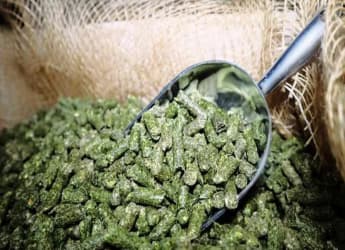
10-20 tons/hour grass pellet plant
The grass pellet machine serves as the core equipment in the 10–20 tons/hour grass pellet plant, enabling the efficient transformation of various grasses into high-density grass pellets. This grass pellet plant is a high-efficiency production facility designed specifically for processing forage and pasture resources. The production process of the fuel pellet plant is both scientific and streamlined. First, mowing and crushing equipment harvests and reduces the grass to suitable sizes for processing. Then, a precise drying system removes excess moisture to prepare the material for pelletizing. At the heart of the line, the grass pellet machine forms the processed grass into uniform pellets under specific temperature and pressure conditions. Afterward, the cooling system rapidly reduces the temperature of the freshly pressed pellets to maintain quality. Finally, the packaging system accurately weighs and bags the pellets. These grass pellets are widely used in livestock feed, biomass energy, and related fields, maximizing the resource value of grass.

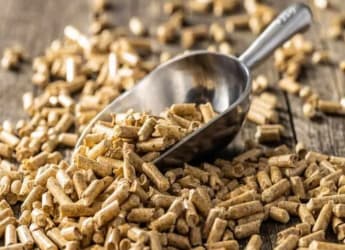
20-40 tons/hour rice husk pellet factory
The rice husk pellet machine is the core equipment in the production of a 20–40 tons/hour rice husk pellet factory, playing a vital role in transforming processed rice husks into dense, uniform pellets. This production line also includes key supporting equipment such as hammer crushers, coolers, and rice husk pellet packaging machines. The hammer crusher handles the initial crushing of rice husks, preparing them for efficient pelletizing. After that, the rice husk pellet mill extrudes the material into pellets. The cooler rapidly brings down the temperature of the freshly formed pellets to maintain quality, and the packaging machine ensures accurate, efficient pellet bagging for storage and sale.
biomass pellets manufacturing process using fuel pellet plant
Now we take the raw material as logs as a case example, and make a brief introduction to the production process of biomass pellet production line, in order to help you have a more comprehensive understanding of the fuel pellet plant.

After peeling the bark from the logs, the logs will be cut into 3-5cm pieces by a chipper; then they will be finely powdered into 2-3mm chips by crusher. And then through the rotary dryer to dry the raw materials to about 15%, and finally for pelletizing processing, processing of finished pellets diameter 6-12mm optional, granulation cooling by the sachet packaging scale packaged into bags, convenient transportation and sale.
01 Peeling section:
Peeling of raw materials can improve the combustion calorific value of the finished pellets, reduce the ash residue after combustion of the finished pellets, and reduce emissions.
02 Chipping section:
Process the logs, etc. into 3-5cm pieces, and then into the processing of the subsequent sections.
02 Crushing section:
This section of the work without dust emissions, the crusher crushed by the fan after the negative pressure suction pneumatic conveying out of the material. Crusher for the teardrop structure, crushing rotor can be positive and negative operation, improve the service life of the hammer blade, motor direct drive mode.
03 drying Section
This section we use rotary dryer, the moisture of wood chips after drying is about 13-18%.
04 Pelletizing section
Biomass pellets diameter 6-10mm optional, biomass pellets with high calorific value, no pollution, low ash content and other characteristics, can be widely used in biomass power plants, biomass steam boilers, household fireplaces, drying ovens and biomass gasifier.
05 biomass pellet cooling
It is used to reduce the temperature and moisture of the pellets, the temperature of the pellets after cooling is generally not higher than room temperature by 5℃, the moisture of the pellets after cooling is about 8-10%, and the capacity of the pellets is 650-750kg/m³. Packing can be based on the customer’s local sales needs, choose the appropriate baling weighing in order to facilitate the customer sales of products, usually have two specifications of small packages and ton packages.

Why choose our fuel pellet plant?
Quality and durability
Our fuel pellet plants are made of high-quality components and materials to ensure long-term reliability of equipment and minimum downtime. The production line is compact in design and reasonable in structure, meets environmental protection requirements, and can be designed according to customer requirements. The RICHI biomass granulator uses SKF bearings and Siemens motors, and the feeder, temperer and Ring Die Diameter are made of stainless steel.
Professional design
Our technical team is composed of experienced professionals with extensive industry experience and expertise. Our dedicated service team can assist in solving any technical problems and ensure your equipment runs efficiently
Customer support
We provide comprehensive customer support, from installation and setup to training, maintenance and troubleshooting, and we provide comprehensive customer support, sending experienced engineers to your on-site guidance on the installation, commissioning and trial run of the production line. At the same time, we also provide comprehensive training for your operators to ensure stable and safe operation. We also regularly track the equipment performance and solve any issues to ensure long-term satisfaction.
Competitive prices
Our fuel pellet plants provide excellent value, competitive prices and a considerable return on investment. There are various types of biofuel pellet plants on the market and different prices, but by choosing our equipment, you can achieve higher economic benefits while ensuring quality.
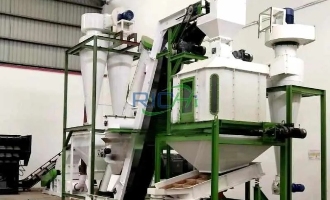
Characteristics
Quality and durability
Professional design
Customer support
Competitive prices
Main equipment for fuel pellet plant
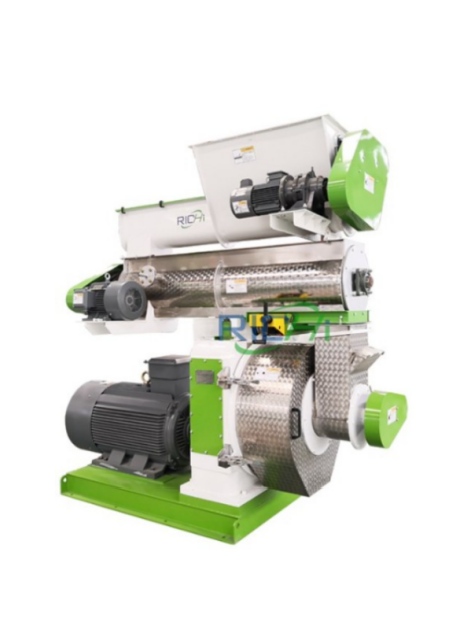
biomass pellets making machine
Biomass pellet making machine has powerful functions. It can not only be used to produce biomass pellets, but also produce and process wood chip pellets, and has a wide range of applications. RICHI MZLH series biomass granulators are equipped with automatic control systems, which effectively ensures the stability of the equipment and significantly improves the quality of granulated products. Moreover, it is easy to operate and can save a lot of manual consumption; it has the advantages of high production capacity and low power consumption; it uses gear transmission, with higher efficiency and 15% higher capacity than belt type; it is also equipped with anti-caking bins and forced feeders, which solves the problem of material feeding and is equipped with a safety pin to prevent overloading, which is practical and reliable.
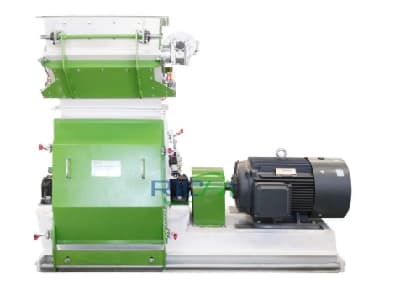
Crusher
The key to the function of the crusher is to break the raw materials into small pellets. RICHI water droplet crusher is designed for wood chips, wood shavings, etc. It is highly targeted and can be accurately crushed, providing suitable pellet size raw materials for subsequent production, helping the entire biomass pellet production process to smoothly start.
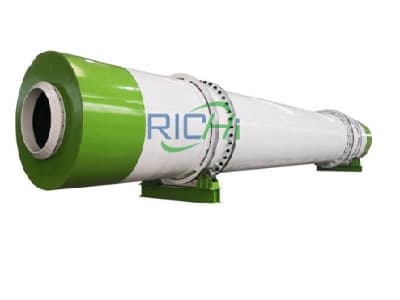
rotary dryer machine
RICHI rotary dryer machine is specially designed for drying raw materials. It has the advantages of stability, efficiency, low consumption, and low failure. It can effectively remove excess moisture from raw materials, make it reach appropriate humidity, and ensure the smooth progress of granulation and other processes.
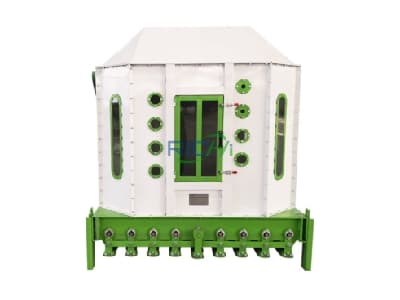
Cooling machine
RICHI countercurrent coolers should not be underestimated. Using advanced countercurrent principles, pellets of about 80°C can be cooled to slightly higher than room temperature 3°C – 5°C, accurately controlling the temperature, which not only prevents pellet rupture, but also facilitates subsequent packaging, ensuring the quality of the finished biomass pellets.
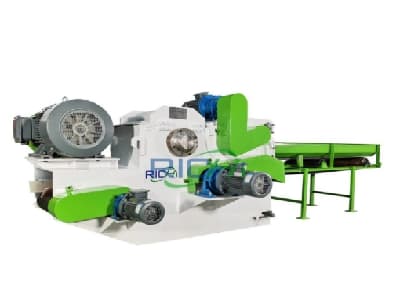
Chipping Equipment
The chipping machine is mainly used to cut down the size of large pieces of wood, in order to facilitate the wood pieces can enter into the crusher for crushing. Both to ensure the effect of pelletizing at the same time can also play a role in protecting the machine. The feeding device adopts variable frequency speed control motor, and the feeding speed and feeding amount can be controlled according to your needs.

RICHI Machinery Latest Case Project
RICHI focuses on turnkey wood chip pellet production line engineering and has successfully provided hundreds of biomass pellet manufacturers with production capacity range of 1 – 90t/h, biomass pellet manufacturing plants, and monomer biomass pellet manufacturing machines.
RICHI products have covered more than 150 countries and regions including Austria, Canada, Germany, Uzbekistan, Mexico, Australia, etc., serving thousands of customers, and many cases have become local benchmark projects. Adhering to the concept of helping the development of the industry, RICHI Machinery hopes to help more customers achieve efficient, high-quality and high-return biomass pellet production business in the future.
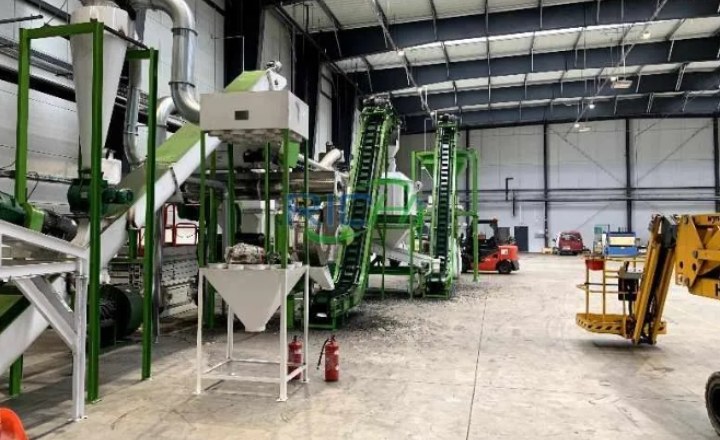
10T/H biomass wood fuel pellet production plant in United States
- Country: USA
- Date: November 2023
- Capacity:10 TPH
- Total Power: 655KW
- Workshop size about this project: 16680m2
- Main equipment in this line: High efficiency biomass wood crushing machine, biomass wood hammer mill for 2-3mm wood chips, pulse dust collector, biomass wood rotary dryer, ring die biomass pelletizer, biomass pellet cooling machine, screening machine, automatic packing machine, sewing machine, and other auxiliary equipment.
- Main raw materials: wood waste from furniture factories, paper mills and other factories
- Final biomass pellet size: 6-8mm
- The install period: 60 Days
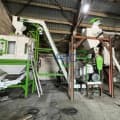
2025.03.22
Moldova, a small biomass pellet factory with a capacity of 1 – 1.5T/H, mainly conducts small-scale biomass pellet production to meet some local needs.
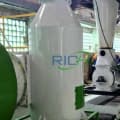
2024.10.19
Germany has built a 2-2.5 tons/hour wood granulation plant, focusing on the use of wood for granulation, providing high-quality pelletized products for local related industries.
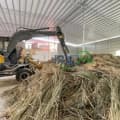
2023.09.21
South Africa’s 2 – 2.5 t/h biomass pellet plants have a certain production capacity, and the biomass pellets they produce serve the local market and provide energy support for many fields.
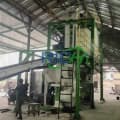
2023.04.10
Canada has established a 2-3T/H wood granulation plant to make full use of the rich local wood resources to carry out granulation business to ensure the stable and orderly progress of production.
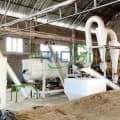
2022.11.10
India has built a 4 T/H Napier grass pellet production line, and further opened up the market for characteristic pellet production by using Napier grass for pellet production.
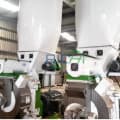
2022.06.12
Australia has built a 2-2.5 T/H wood pelletizing plant. With the advantages of local wood resources, it has carefully created a wood pelletizing production project to provide strong support for related industries.
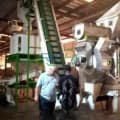
2022.03.26
Malaysia has a 5-6T/H biomass pellet production line. With its moderate production capacity, it ensures the stable supply of biomass pellets and meets local and surrounding market demands.
RICHI MACHINERY
How to process high quality poultry pellets?
The supported adjustment sites are as follows. You can choose to use the “multi-language site” template that comes with the
01
Small biomass pellet plant (Moldova, 1-1.5T/H production capacity)
1T/H straw pellet production line has high cost performance, is quickly completed with installation and debugging, is simple to operate, stable production capacity, and has quick after-sales response.
RICHI
02
Medium-sized wood processing plant (Germany, 2.5T/H wood granulation plant)
The customized MZLH520 pellet mill is combined with a three-stage crushing system, and the hardwood pellet forming rate has been greatly improved, and the gear transmission efficiency is high, saving a lot of electricity bills every month.
RICHI
03
Agricultural Waste Treatment Project (India, 4T/H Napier Grass Grain Line)
“Drum Drum Drying Machine + Forced Feeding System” improves drying efficiency, and the pellet mill stainless steel ring mold resists corrosion and extends service life.
RICHI
RICHI MACHINERY
Why Choose RICHI Machinery
Choosing RICHI Machinery means you’ll receive not only high – quality equipment but also one – stop solutions and comprehensive service support. Here are some key reasons to choose us:

30 years of industry experience
Since its establishment in 1995, RICHI Machinery has amassed 30 years of rich experience in the design, production, and R & D of fuel pellet plant. With our profound technical accumulation and global development, we can provide our customers with reliable equipment and solutions.

Customized turnkey solutions
We offer a complete turnkey production line, covering project design, equipment manufacturing, installation and commissioning, and personnel training, according to your specific needs. Whether it’s a small farm or a large feed factory, we can tailor a suitable production plan for you.

Complete after – sales service
We have a comprehensive after – sales system, providing you with all – round services from pre – sales consultation to after – sales maintenance. This includes professional and systematic training to help you quickly master equipment operation and maintenance skills and maximize project requirements.

Built Around Your Needs
We can create customized turnkey pellet production line projects based on your unique requirements. For example, in this project, we provided customized technical solutions and operation training for the fuel pellet plant to help the production line operate stably in the long term. You can find us on YouTube.

Frequently Asked Questions
How much does it cost to build a biomass pellet factory?
The cost of building a biomass pellet plant is affected by many aspects, including production scale, labor, factory buildings, equipment, raw materials and transportation costs, among which the production scale is particularly affected, and the larger the scale, the higher the cost. Typically, the cost of 3-4T/H production lines ranges from $20,000 to $100,000. Labor costs vary with production capacity, and larger scales require more workers and higher costs.
RICHI Machinery can provide customized production lines as required, and the equipment price is ex-factory, which can reduce construction costs. If you want to start a biomass pellet business, please contact us to obtain customized solutions and quotations.
Is it difficult to install and debug the equipment? How long will it take?
Don’t worry, installation and debugging are worry-free!
- Before the equipment is shipped, we will assemble and debug in advance to ensure that all components can operate normally.
- After the equipment arrives, we send professional engineers to the site to guide the installation process throughout the process, and will also train workers step by step to teach you how to use it and what to pay attention to.
- Generally, small production lines can be installed and commissioned in about one week, while large ones are about 2 weeks. The specific size depends on the production line, so that they can be used in one go.
Is the equipment maintenance troublesome? Need a professional?
Maintenance is very simple, just follow the manual!
- Only, just regularly apply oil and dust to key parts of the equipment, check whether the circuit and operating parts are normal, and ordinary people can operate it by reading the instructions.
In case of problems, please contact us at any time. The after-sales team will be online 24 hours a day, with remote guidance or homepage solutions. We will also conduct regular inspections to help you check for hidden dangers in advance so that the equipment can be operated stably.
Can the production line capacity be adjusted according to demand?
Of course, it is very convenient to adjust flexibly!
- If you want to expand the output, you can increase the number of granulators, replace them with larger crushers or dryers, upgrade the conveying equipment, etc., and expand as needed step by step.
Our technical team will provide customized solutions for various fuel pellet plants based on your actual needs to help you calculate the cost, which not only meets the production capacity without wasting investment.
If you have any questions, please feel free to ask us. From factory construction planning to equipment debugging and after-sales maintenance, we will answer you throughout the process, so that you can save you investment and produce with peace of mind!

CUSTOM SOLUTIONS
—— GET A QUOTE ——
Accurate control of cost accounting, scientific calculation of expected profits, to achieve cost reduction and efficiency, profit can be expected.From equipment selection and program planning in the early stage
Checking Order
Quality Test Before Delivery
Check Items When Packing
Packaging And Transport
Training Support
After-sale Service

